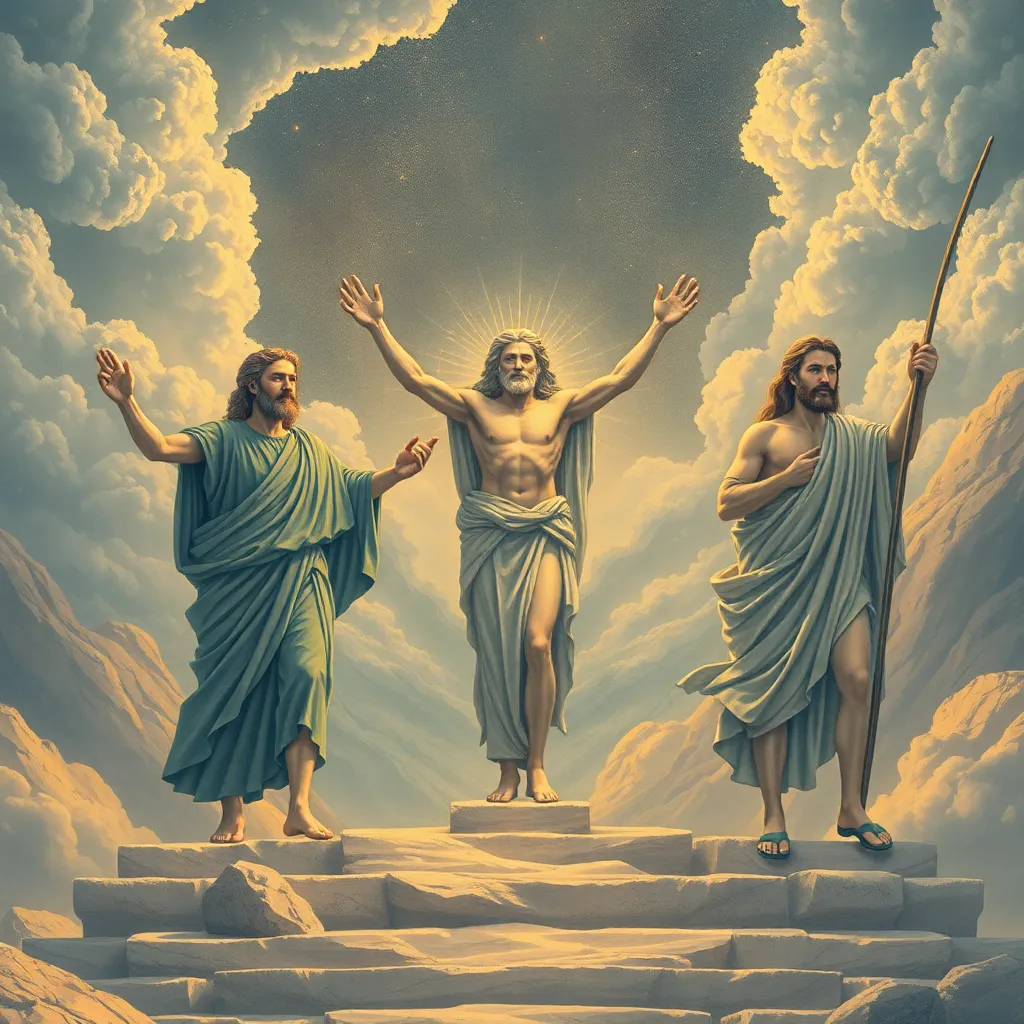The Olympians and Their Influence on Modern Spiritual Practices
I. Introduction
The Olympians, in ancient Greek mythology, refer to the pantheon of twelve principal deities who resided atop Mount Olympus. These gods and goddesses were central to the spiritual and cultural life of ancient Greece, embodying various aspects of human existence and the natural world.
The significance of the Olympians extends beyond their mythological narratives; they have profoundly influenced spirituality, art, literature, and modern religious practices. This article aims to explore the enduring impact of these ancient deities on contemporary spiritual practices, examining how their archetypes and stories resonate with modern seekers of meaning.
II. Historical Context of the Olympians
The origins of the Olympian deities can be traced back to early Greek religion and mythology, where they emerged as powerful figures representing different facets of life and nature. The major Olympians include:
- Zeus: King of the gods, god of the sky and thunder.
- Hera: Queen of the gods, goddess of marriage and family.
- Athena: Goddess of wisdom, craft, and war.
- Apollo: God of the sun, music, and prophecy.
- Aphrodite: Goddess of love and beauty.
- Poseidon: God of the sea and earthquakes.
- Demeter: Goddess of agriculture and fertility.
- Artemis: Goddess of the hunt and wilderness.
- Hephaestus: God of fire and craftsmanship.
- Hermes: Messenger of the gods, god of commerce and travel.
- Dionysus: God of wine, pleasure, and festivity.
- Hades: God of the underworld.
In ancient Greek society, the Olympians played a vital role in religion, with rituals and festivals held in their honor. Temples were built, and myths were recounted, emphasizing their importance in the lives of the people.
III. Symbolism and Archetypes of the Olympians
Archetypes are universal symbols or themes that resonate within the human psyche and are often explored in spiritual practices. The Olympians symbolize various human experiences and qualities, making them relevant to contemporary spirituality.
Each Olympian embodies specific traits:
- Zeus: Authority and leadership.
- Athena: Wisdom and strategic warfare.
- Aphrodite: Love and beauty.
- Poseidon: Power and unpredictability.
These archetypes serve as mirrors reflecting our inner struggles, aspirations, and moral dilemmas. In modern spiritual practices, individuals may invoke these archetypes to gain insight into their lives, fostering personal growth and understanding.
IV. The Revival of Hellenistic Spirituality
In recent decades, there has been a resurgence of interest in ancient Greek religion, often referred to as Hellenistic spirituality. This revival encompasses various movements that seek to reconnect with the wisdom and practices of the Olympians.
Modern neopaganism and Hellenism are significant in this revival, with practitioners celebrating rituals, festivals, and offerings to the Olympians. These movements emphasize:
- Restoration of ancient rites and traditions.
- Personal connections with the deities.
- Community building around shared beliefs and practices.
This revival illustrates the adaptability of ancient spiritual practices to contemporary contexts, allowing individuals to find personal meaning in the Olympian pantheon.
V. The Olympians in Art and Literature
The influence of Olympian themes extends to modern literature and art, where contemporary creators draw inspiration from these ancient deities. The stories and characteristics of the Olympians continue to inspire various forms of expression.
Examples of contemporary works inspired by the Olympians include:
- Books: “Circe” by Madeline Miller reimagines the life of the enchantress Circe, exploring her interactions with the gods.
- Films: “Clash of the Titans” and “Percy Jackson & The Olympians” leverage the rich narratives of Greek mythology.
- Visual Arts: Many modern artists incorporate Olympian themes in their works, depicting gods and goddesses in novel contexts.
These representations not only keep the stories of the Olympians alive but also influence spiritual beliefs and practices, encouraging individuals to explore their connections to these ancient figures.
VI. Integrating Olympian Wisdom into Modern Spirituality
Individuals seeking to incorporate Olympian teachings into their daily lives can find practical applications of these ancient wisdoms. Some rituals and practices inspired by the Olympian pantheon include:
- Daily Invocations: Beginning the day with a meditation or prayer to a specific Olympian for guidance.
- Seasonal Festivals: Celebrating ancient festivals such as the Panathenaea in honor of Athena or the Dionysia for Dionysus.
- Creative Expression: Engaging in art, music, or writing that reflects themes associated with the Olympians.
Case studies of individuals or communities that have adopted these practices highlight the transformative power of integrating mythological influences into personal spiritual journeys.
VII. Critiques and Challenges
While the revival of Olympian worship and practices offers enriching spiritual experiences, it also raises important critiques and challenges. Key issues include:
- Cultural Appropriation: Concerns about the appropriation of ancient Greek culture by modern spiritual movements.
- Authenticity: Questions regarding the fidelity of modern practices to ancient traditions.
- Balancing Tradition and Relevance: The challenge of adapting ancient practices to fit contemporary spiritual needs without losing their essence.
Addressing these critiques requires a thoughtful approach to integrating ancient wisdom with modern beliefs, promoting respect for the original cultural contexts of the Olympians.
VIII. Conclusion
The Olympians have left an indelible mark on modern spiritual practices, serving as powerful symbols and archetypes that resonate with contemporary seekers. Their stories and teachings continue to inspire individuals, providing insights into various aspects of human experience.
The ongoing relevance of ancient wisdom invites reflection on how these mythological influences can enrich personal spiritual journeys. As individuals explore the integration of Olympian teachings into their lives, they connect with a rich tapestry of history, culture, and spirituality that transcends time.




